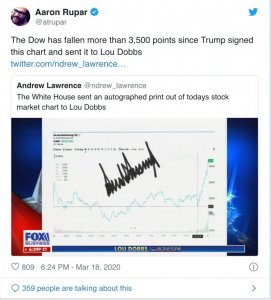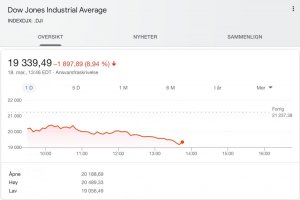Se linken, merket 1929-33.
https://en.wikipedia.org/wiki/Causes_of_the_Great_Depression#Leave-it-alone_liquidationism_(1929–33)
In his memoirs, President Hoover wrote bitterly about members of his Cabinet who had advised inaction during the downslide into the Great Depression:
The leave-it-alone liquidationists headed by Secretary of the Treasury Mellon ... felt that government must keep its hands off and let the slump liquidate itself. Mr. Mellon had only one formula: "Liquidate labor, liquidate stocks, liquidate the farmers, liquidate real estate ... It will purge the rottenness out of the system. High costs of living and high living will come down. People will work harder, live a more moral life. Values will be adjusted, and enterprising people will pick up the wrecks from less competent people."[90]
Before the Keynesian Revolution, such a liquidationist theory was a common position for economists to take and was held and advanced by economists like Friedrich Hayek, Lionel Robbins, Joseph Schumpeter, Seymour Harris and others.[94] According to the liquidationists a depression is good medicine.
Economists such as John Maynard Keynes and Milton Friedman suggested that the do-nothing policy prescription which resulted from the liquidationist theory contributed to deepening the Great Depression.[92] With the rhetoric of ridicule Keynes tried to discredit the liquidationist view in presenting Hayek, Robbins and Schumpeter as
...austere and puritanical souls [who] regard [the Great Depression] ... as an inevitable and a desirable nemesis on so much "overexpansion" as they call it ... It would, they feel, be a victory for the mammon of unrighteousness if so much prosperity was not subsequently balanced by universal bankruptcy. We need, they say, what they politely call a 'prolonged liquidation' to put us right. The liquidation, they tell us, is not yet complete. But in time it will be. And when sufficient time has elapsed for the completion of the liquidation, all will be well with us again...
Milton Friedman stated that at the University of Chicago such "dangerous nonsense" was never taught and that he understood why at Harvard —where such nonsense was taught— bright young economists rejected their teachers' macroeconomics, and become Keynesians.[90] He wrote:
I think the Austrian business-cycle theory has done the world a great deal of harm. If you go back to the 1930s, which is a key point, here you had the Austrians sitting in London, Hayek and Lionel Robbins, and saying you just have to let the bottom drop out of the world. You've just got to let it cure itself. You can't do anything about it. You will only make it worse [...] I think by encouraging that kind of do-nothing policy both in Britain and in the United States, they did harm.[92]
Dette sier jo ingenting om hva som faktisk skjedde. Fra høsten 1929 til sommern 1930 var der lite intervensjon. Da gikk arbeidsledigheten fort opp til 9% for så å minke ned mot 6% mot sommern 1930. Den sommern signerte Herbert Hover Smoot–Hawley Tariff Act Deretter økte arbeidsløedigheten betraktelig.
https://en.wikipedia.org/wiki/Smoot–Hawley_Tariff_Act
"In May 1930, a petition was signed by 1,028 economists in the United States asking President Hoover to veto the legislation, organized by Paul Douglas, Irving Fisher, James T.F.G. Wood, Frank Graham, Ernest Patterson, Henry Seager, Frank Taussig, and Clair Wilcox.[11][12] Automobile executive Henry Ford also spent an evening at the White House trying to convince Hoover to veto the bill, calling it "an economic stupidity",[13] while J. P. Morgan's Chief Executive Thomas W. Lamont said he "almost went down on [his] knees to beg Herbert Hoover to veto the asinine Hawley–Smoot tariff".[14]
While Hoover joined the economists in opposing the bill, calling it "vicious, extortionate, and obnoxious" because he felt it would undermine the commitment he had pledged to international cooperation, he eventually signed the bill after he yielded to influence from his own party, his Cabinet (who had threatened to resign), and business leaders.[15] "
Mye av dette er også dokumentert i boken Out of Work Unemployment And Government In Twentieth Century America
https://www.goodreads.com/book/show/1151599.Out_Of_Work
Et interessant sitat derifra her:
"[T]he failure of money wages to fall in the downturn beginning in the fall of 1929 was largely a consequence of public-policy intervention by President Hoover and his political allies. As a consequence of this intervention, real wages rose rather than fell, and unemployment increased to previously unattained levels. The Great Depression was not a tragic example of market failure as is conventionally believed, but rather was an example of government failure."
Når det gjelder "The Forgotten Depression 1921" se James Grants bok ved samme navn. Sitat fra Grant her:
https://www.theobjectivestandard.com/2015/09/the-forgotten-depression1921-by-james-grant/
“[A] living experiment in economic policy was unfolding on a national scale (p. 215),” Grant observes. “Public-works spending, farm-price maintenance, and wage support were rather the new, constructive responses to the weakening of aggregate demand” (p. 214).
“As posterity knows,” concludes Grant, “the experiment failed” (p. 215). Whereas the comparatively short 1920–21 crash was followed by “a powerful, job-filled recovery (p. 1),” the 1929–33 crash, which experienced “a commodity price decline . . . not so severe as in the 1920–21 collapse (p. 216),” dragged on for four years, followed by years of grinding stagnation.
Why wasn’t the 1920–21 affair just as terribly ‘great’ as the one that enveloped Herbert Hoover?” Grant posits (p. 213). “The trouble with Hoover’s policy,” Grant amply shows, “is that it didn’t conform more closely to Wilson’s and Harding’s nonpolicies” (p. 217). As Grant modestly concludes:
There are no controlled experiments in economics. No one living through the Great Depression could be exactly sure how to apportion blame among the domestic and foreign causes. Still less can posterity be certain. What we can observe, even at this great distance of years, is that the price mechanism worked more freely in 1920–21 than it was allowed to do in 1929–33. “[T]he end result of what was probably the greatest price-stabilization experiment in history proved to be, simply, the greatest and worst depression,” concluded one of the wisest of the contemporary postmortems of the Depression, Banking and the Business Cycle, published in 1937."
Så nei jeg er nokk ikke enig med deg her Asbjørn. Det var ikke hands off i perioden 1929-33.








